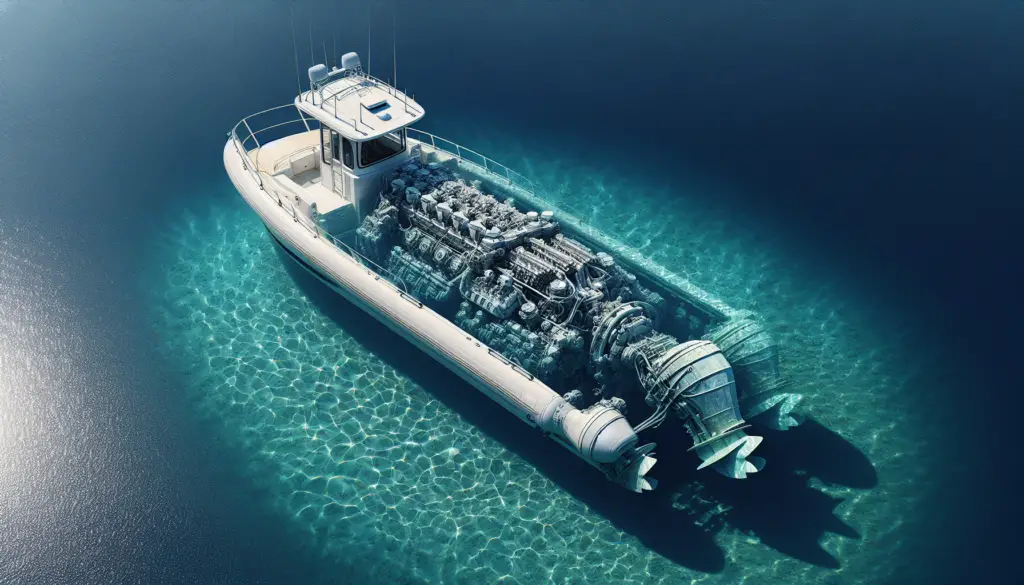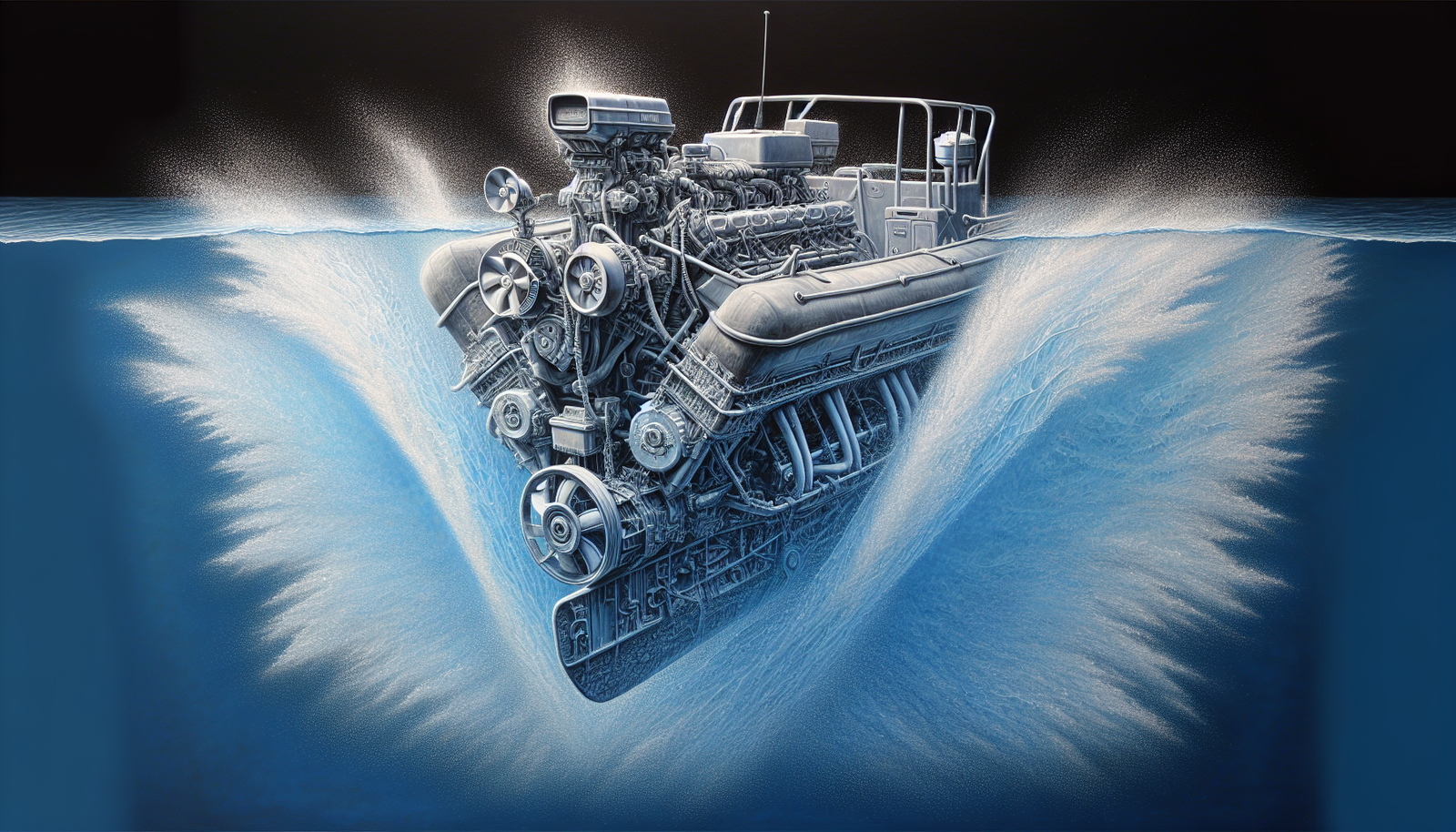Imagine you’re out on the water, enjoying a sunny afternoon on your favorite watercraft. While you’re reveling in the beauty of the lake or the sea, have you ever wondered about the boat engine beneath the deck? As it turns out, boat engines can significantly affect water quality. This article will detail the intricate connection between boat engines and water quality, examining how certain types and models of engines can cause varying degrees of water pollution. This guide is especially beneficial for environmentally conscious individuals who aim to maintain cleanness and safety around their maritime surroundings. It’s a deep dive into the intersection of leisure and environmental responsibility that you won’t want to miss.

Boat Engine Types and their Water Impact
When you consider boating, it’s crucial to understand the different kinds of boat engines available. This is because your choice of engine type can have a significant impact on the marine environment, particularly water quality. Whether you prefer outboard, inboard, or sterndrive engines, each one has a unique operating mechanism and therefore, contributes differently to water pollution.
Understanding Different Boat Engines
Outboard engines are the most common type you’ll see. They’re attached to the stern and provide both propulsion and steering. Inboard engines, on the other hand, are fixed inside the boat’s hull, with an external drive system for propulsion. Sterndrive, also known as inboard/outboard engines, are located inside the boat but stick out the back, combining the characteristics of both outboards and inboards. Knowing these differences is your first step towards responsible boating.
How Boat Engines’ Types Impact Water Quality
The type of engine you opt for plays a big role in shaping the water quality. For instance, outdated two-stroke outboard engines are often criticized for their high rates of fuel discharge into the water. In contrast, modern four-stroke or direct fuel injection engines have less discharge and are thus more environmentally friendly.
Pollutants from Boat Engines
One of the main ways boat engines affect the marine environment is through the discharge of pollutants. These pollutants can considerably degrade water quality and harm marine life.
Types of Pollutants
These pollutants primarily include oil and fuel, exhaust emissions, noise, and heat. Often, some of these can be invisible and odorless, making them more insidious.
How Pollutants Enter Water Bodies
Pollutants make their way into the water through various practices. For instance, fuel and oil might leak during refueling or from poorly maintained engines. Inefficient engines can emit uncombusted fuel and exhaust emissions directly into the water.
Impact of Pollutants on Water Quality
Each pollutant can negatively affect water quality in multiple ways. Oil and fuel create an obvious sheen on the water surface and can be harmful to marine organisms. Exhaust emissions such as carbon monoxide or sulfur oxides can dissolve in water, increasing its acidity and reducing its oxygen content, which directly affects marine life.
Understanding the Chemistry of Fuel Combustion
Knowing the basics of how fuel combustion works in boat engines can give you a clearer picture of how pollutants emerge and affect water quality.
Combustion Processes in Boat Engines
When ignited, the fuel-air mixture in the engine’s combustion chamber burns, creating energy. This reaction releases different compounds depending on how complete the combustion process was.
Chemical Byproducts of Combustion
Complete combustion ideally releases just carbon dioxide and water. However, in real-life conditions on a boat, the combustion is often incomplete, resulting in harmful byproducts such as carbon monoxide, nitrogen oxides, and uncombusted hydrocarbons.
Water Pollution Caused by Combustion Byproducts
These byproducts have varying effects on water pollution. For instance, carbon monoxide dissolves in water and reduces its oxygen content, while nitrogen oxides can lead to an overgrowth of harmful algae.

Oil Spills and Leakage from Boat Engines
Oil leakage is one of the most visible forms of pollution from boat engines, with serious impacts on water quality.
How Oil Spills Occur
Oil spills can occur during careless refueling, or they can result from leaks in poorly maintained engines. The oil then spreads on the water surface, creating a layer that inhibits oxygen exchange between the water and air.
Impact of Oil Leakage on Water Quality
This oil layer can be toxic for many marine organisms. It also blocks sunlight, affecting photosynthesis in aquatic plants and disrupting the entire food chain.
Preventing Oil Leakage and Spills
To prevent oil spills, careful and attentive practices during refueling are essential. Regular engine maintenance can also minimize the chance of oil leaks, helping maintain water quality.
Noise Pollution from Boat Engines
Boat engines are not only a source of water pollution but also noise pollution, which can disturb aquatic life significantly.
How Boat Engines Cause Noise Pollution
Most boats are powered by engines that create noise. While you might enjoy the rumble of your boat engine, this noise is broadcast into the water, where it can be disruptive for many underwater creatures.
Effect of Noise Pollution on Aquatic Life
Noise pollution can interfere with the ability of aquatic organisms, especially ones relying on sound for communication or navigation. It can lead to behavioral changes, impact reproduction, and even cause physical damage in extreme cases.
Techniques to Reduce Noise Pollution
To minimize noise pollution, you can ensure your engine is well-maintained and functioning efficiently. Newer engines also tend to be quieter, and there are soundproofing products available for boats.
Exhaust Emissions and Water Quality
Exhaust emissions are an unavoidable part of operating a boat, but with some awareness and effort, their impact on water quality can be mitigated.
Exhaust Emissions from Boat Engines
Boat engines often emit a mix of carbon dioxide, carbon monoxide, unburnt hydrocarbons, and nitrogen oxides. These gases are produced during the combustion process, depending on factors such as fuel type and engine condition.
How Exhaust Emissions Contaminate Water
Exhaust emissions can have several effects on water quality. They can increase water acidity, decrease oxygen levels, and contribute to harmful algal blooms.
Mitigating the Impact of Exhaust Emissions
Switching to cleaner fuels, regularly maintaining your engine, and investing in more efficient models can all help reduce the quantity of harmful exhaust emissions.
Boat Engine Maintenance and Water Quality
Engine maintenance isn’t just about keeping your boat running smoothly – it’s also about protecting water quality.
Importance of Regular Engine Maintenance
Regular maintenance can help prevent oil and fuel leaks, make your engine run more efficiently, and reduce the volume of harmful emissions.
How Poor Maintenance Affects Water Quality
If not properly maintained, engines can become less efficient, burn fuel incompletely, and leak oil. All of this contributes to pollutants entering the water, degrading its quality and harming marine life.
Proper Maintenance Practices to Reduce Water Pollution
To reduce water pollution, regular maintenance checks are important. Always look out for oil leaks, keep your engine tuned, and replace worn-out parts promptly to keep your engine running cleanly and efficiently.
Regulations for Boat Engine Emissions
Regulations exist to protect water quality from boat engine emissions and guide boaters towards more eco-friendly practices.
Current Regulations on Boat Emissions
Numerous countries have regulations to limit the quantity and types of emissions boats can produce. These might relate to allowable emission levels, the type of fuel used, or the design and maintenance of marine engines.
How Regulations Protect Water Quality
By setting limits on boat emissions, these regulations help prevent excessively polluted discharge from entering the water. Not only does this protect water quality, but it also benefits the health of marine ecosystems.
Future Regulations and Changes
The future will likely see even stricter emission regulations to further protect water quality. The trend is moving towards cleaner fuels, better engine designs, and effective on-board pollution control systems.
Innovations in Boat Engine Technology for Water Conservation
Fortunately, engine technology is rapidly advancing, with numerous innovations aimed at reducing the impact of boating on water quality.
Latest Innovations and Technologies
These innovations include more efficient engine designs, cleaner fuels, and sophisticated on-board systems for waste and emission management. Electric engines are another promising technology offering zero direct emissions and quiet operation.
How New Technologies are Improving Water Quality
By reducing the quantity and toxicity of pollutants produced, these technologies directly improve water quality. They also provide a more sustainable way to enjoy boating, minimizing its impact on the environment.
Incorporating New Technologies in Boat Engines
While transitioning to these new technologies might require some investment, the benefits they provide for water quality make it a worthwhile move. Boaters, manufacturers, and policymakers all have a role in promoting and adopting these technologies.
Future of Boat Engines and Water Quality
Looking to the future, protecting water quality from boat engine pollution will remain a pressing issue. Thankfully, with advancements in technology and increased awareness, progress is being made to tackle this problem.
Predicted Future Impacts on Water Quality
Without changes in boating habits and adoption of cleaner technologies, water quality will continue to be affected by traditional boat engine pollutants. This could lead to declining health of marine ecosystems, affecting biodiversity and potentially even human activities like fishing and water sports.
Preventing Future Water Quality Degradation
Preventing this future requires a joint effort from boaters, industry, and regulators. From keeping your boat well-maintained and following good practices, all the way to supporting eco-friendly engine innovations and regulations, we can all contribute towards healthier water bodies.
How Evolving Boat Engine Technology will Impact Water Quality
As boat engine technology continues to evolve, it’s expected to become cleaner and more efficient, helping to improve water quality. Electric engines, biofuels, and advanced emission control systems are just a few examples of promising advancements. The future holds the potential for boating that’s enjoyable, sustainable, and kind on the environment. So next time you’re out on the water, remember that your choices matter, for your boat’s performance and for the health of our precious water resources.

